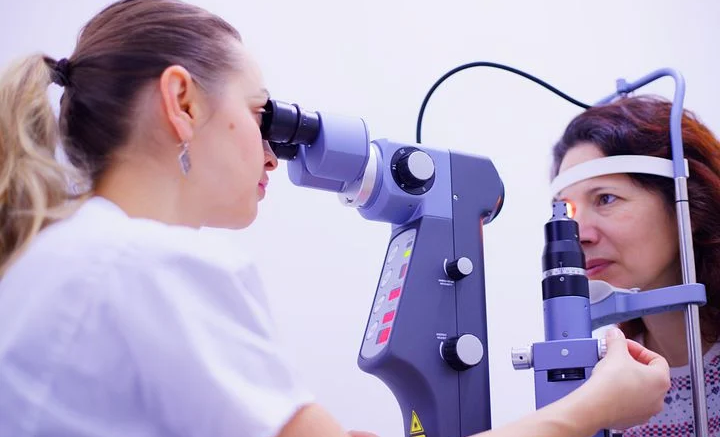Having a healthy and properly functioning pair of eyes is something we all want and need. And making sure that your vision remains sharp throughout life is just as important as eating right and exercising regularly (maybe even more so). But like most people, you might not realize that an eye exam with an optometrist can play an important role in maintaining healthy vision well into old age. In this post, we’ll discuss why it’s so crucial to get regular eye exams on a yearly basis – if not more often.
Keeping Your Vision Healthy
Maintaining healthy vision is important for overall health and quality of life. That’s why scheduling annual, comprehensive eye exams is highly recommended. An annual eye exam allows early detection of vision problems and eye diseases, many of which do not have obvious symptoms in the early stages. Your eye doctor can check for conditions like glaucoma, cataracts, macular degeneration, and diabetic retinopathy. Catching and treating these diseases in their earliest stages can help prevent vision loss or blindness. An eye exam will also check for vision changes like nearsightedness, farsightedness or astigmatism which can then be addressed with prescription glasses or contacts; if you do wear contacts, you’ll want to schedule a contact lens exam as well.
Your eye doctor can check the overall health of your eyes to screen for infection, dry eyes, and other common eye health issues. They can then provide tips for eye strain relief and eye health promotion. Protecting vision for life through annual eye health exams helps ensure you see clearly and safely for work, hobbies, and daily tasks.
Early Detection of Eye Disease
Early detection is one of the most important reasons to receive an annual eye exam. A comprehensive eye exam can help detect diseases and conditions before they cause permanent damage. If you are experiencing any symptoms, such as blurred vision or eye pain, it’s best to get your eyes checked by an optometrist as soon as possible so that treatment can be started immediately.
Early treatment is also important for preventing further loss in vision or even blindness from certain conditions such as glaucoma. Early detection allows for more effective treatments, as opposed to waiting until later stages where treatments may not be as effective at reversing damage already done.
A Healthy Lifestyle
Here are some ways to stay healthy in both mind and body that can also positively impact eye health:
- Exercise regularly: Cardio and strength-training workouts bring oxygen and nutrients to tissues, including the eyes. Aim for at least 30 minutes per day.
- Maintain a healthy diet: Eat plenty of eye-nourishing fruits and vegetables rich in Vitamin C, Vitamin E, zinc, and omega-3 fatty acids.
- Stay hydrated: Drink enough fluids, like water and herbal tea, to avoid dehydration and dry eyes.
- Practice good eye hygiene: Avoid touching or rubbing eyes, wash hands regularly before contact lens wear, replace eye makeup often to reduce infections.
- Reduce screen glare: Use proper lighting when using screens/devices, enabling night shift modes, lowering brightness, taking frequent breaks to prevent digital eye strain.
- Soothe stress: Try calming activities like meditation, yoga, nature walks, and massages which can minimize strain on eyes that comes from mental focus on close tasks when anxious.
- Get restful sleep: Aim for 7-8 hours per night to allow eyes time to rehydrate and renew; lack of sleep can be linked with dryness, dark circles and wrinkles under the eyes
Proper Sunglasses Recommendations
If you have eyeglasses or contacts, it’s important to know that your recommendation for sunglasses should be based on your prescription. A proper pair of sunglasses should block 100% of UV rays and not distort images. They should also be polarized in order to reduce glare from reflective surfaces such as water and snow, which can cause headaches and eye strain. If possible, try on different pairs before buying because there are many varieties available for different face shapes and sizes–not everyone looks good in the same style!
Finally–and this may sound obvious, but it’s worth repeating: make sure that any pair you buy is comfortable on your face! If they’re too heavy or bulky or tight around the bridge of your nose, then they won’t serve much purpose – you’ll want your glasses to fit well on your face so you can see properly through the lenses.
Prescription Changes
You should get a new eye exam every year, because your prescription can change with age and other factors. For example, if you have cataracts or glaucoma, you might need new lenses or medication. If you have diabetes or high blood pressure, these conditions may affect the health of your eyes as well. Regardless, you should expect your prescription to change every few years, which is something your eye doctor can assess further.
Protect Your Eyes!
If you haven’t had an eye exam recently and are experiencing vision problems such as blurry distance vision or trouble focusing, it’s time for another visit with your optometrist. Remember, annual checkups are important even if nothing feels wrong with your health or vision, because there may also be lingering problems you do not notice upfront.
